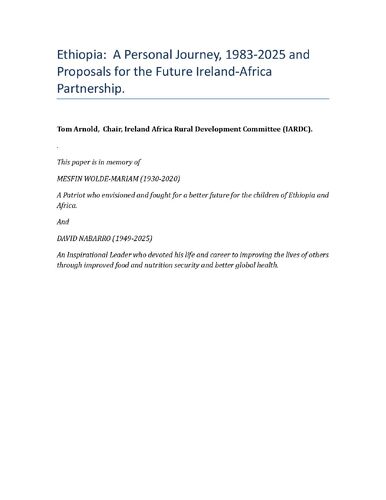Executive Summary
This paper consists of two parts: the first looking back over the past 50 years and drawing
lessons from Ethiopian and African history: the second looking to the coming decades when
Africa is likely to become a more significant geopolitical and economic player on the world
stage. The connection between the two parts is that the lessons from the past are entirely
relevant to the future.
The first part of the paper draws on the coincidence of five visits I made to Ethiopia over the
1983 to 2015 period which marked important points in Ethiopian history. In linking these
occasions, the narrative covers Ethiopia’s troubled history since the 1970s; a bloody period
of authoritarian rule; and a major famine in the 1980s. Two visits post 2000, in 2004 for
Kofi Annan’s speech to an AU Summit on a ‘Uniquely African Green Revolution’ and in 2015
for the Ethiopian government’s Seqota Declaration committing to the elimination of child
stunting by 2030, were moments of great political and historical significance, specifically for
Ethiopia but more generally for Africa.
The Ethiopian experience and success in its agrifood and social protection policies were
taken account of in the development of the Kampala Declaration, a 10-year (2026 to 2035)
transformation agenda for African food systems, adopted by the AU in January 2025.
The second part of the paper looks at the future Ireland-EU-Africa partnership. It discusses
Ireland’s historical relationship with Africa, citing the positive contribution made by Irish
missionaries from the mid-19th century onwards and by Irish NGOs from the 1960s
onwards. It notes the degree to which the Irish government and notable individuals and
NGOs supported human rights for Africans, the decolonisation process, peacekeeping and
the fight against famine and food and nutrition insecurity.
Looking to the future decades, for Africa to achieve its potential it will have to be successful
in two key areas: preventing and resolving conflict and developing its agrifood sector and
rural economy.
This is the context within which a judgement is made as to how Africa’s needs and priorities
should be matched with Ireland‘s strengths and capabilities. Four priorities are proposed:
nutrition, sustainable food systems, food and climate, and an enhanced geopolitical
relationship which would be key to the Ireland- EU- Africa partnership over the coming
decades.
In the short-term - to end 2025- Irish political leaders and policy makers are faced with
three obvious priorities: agree a coherent Irish position on food and climate for COP 30;
prepare for the AU-EU Summit in Angola in November: and agree on the priorities for
Ireland’s 2026 EU Presidency including a distinctive African dimension
